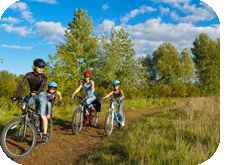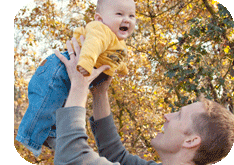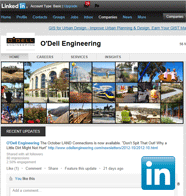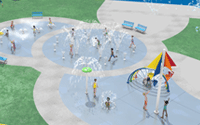How Family Based Recreation Affects Family Satisfaction
Author: Chad Kennedy, Landscape Architect, ASLA
 Modern families spend countless hours tethered to electrical sockets via electronic toys, phones, computers and tablets. Hours each week are spent playing video games, text messaging, talking on the phone and visiting with friends away from the home. These demands coupled with those of schooling, extracurricular activities and social interaction leave families with little time together and a world of challenges to face. With such extreme common place conditions like these, isn't it amazing that research continues to show, with overwhelming consistency, that family leisure and recreation is the number one predictor of satisfaction with life and families in general, not only for parents, but for all family members.1
Modern families spend countless hours tethered to electrical sockets via electronic toys, phones, computers and tablets. Hours each week are spent playing video games, text messaging, talking on the phone and visiting with friends away from the home. These demands coupled with those of schooling, extracurricular activities and social interaction leave families with little time together and a world of challenges to face. With such extreme common place conditions like these, isn't it amazing that research continues to show, with overwhelming consistency, that family leisure and recreation is the number one predictor of satisfaction with life and families in general, not only for parents, but for all family members.1
The Benefits of Family Based Recreation: Recent, as well as past, research shows that families benefit greatly from joint recreation and leisure activities, whether positive or negative. Families that recreate together are increasingly able to communicate, problem solve, compromise, negotiate, interact socially, trust others, show affection and kindness, and to understand limitations and rules.1,4 Other benefits of recreating or playing together may include higher levels of family satisfaction and functioning, better maintenance of relationships, creation of stronger bonds, more opportunities for learning and teaching and smoother adaptation to change.2 It is in the very fact not all family activities are fun for everyone and conflicts occur, that many of these benefits are realized.
Types of Family Leisure (recreation): The Core + Balance Model of family leisure identifies two types of important family recreation, Core and Balance.
Core Leisure activities are common place, safe and familiar activites to all family members. They encompass common family activities that occur in and close to home. Examples of these types of activities include visits to the neighborhood park or playground, bike rides on local trails and streets, movie or game nights, cooking dinner together, playing in the yard, and picnics. Research has shown these activities to have the highest impact of all activities on the satisfaction and well being of families.1 The demands on life can often be threatening and demanding. Core activities allow families to learn to be flexible and adapt to these demands in a comfortable, familiar and more relaxed environment.5
Balance Leisure activities are not regular activities and tend to be associated with a feeling of novelty and unfamiliarity. They will generally occur far from the comforts of home and in unfamiliar territory. These activities tend to be annual vacations and weekend trips to theme parks, camping or fishing destinations or other attractions. These activites introduce families to unknown scenarios where family functioing is tested and stretched. Though essential to healthy family functioning they are less important than core leisure activities.1

Family Member Roles and Satisfaction: All families are different and so are their members. It is crucial to understand that the most benefit comes from recreational activities that are enjoyable for all members of the family. Designers of recreational spaces must design with diversity in mind to truly create spaces with inter-generational value where positive experiences are nurtured and negative experiences are limited. When this occurs families have recreational environments within which growth and improved functioning can occur for all members. As would be expected, research has shown that mothers, fathers, adolescents and children all perceive satisfaction in recreation differently.
Mothers tend not to enjoy leisure experiences as readily due to schedule restraints and preparation for leisure. They still participate however out of a sense of responsibility.2 Relieving stress on mothers to help recreation become more enjoyable may be as simple in some cases as providing diaper changing stations, family restrooms, adequate trash receptacles, stroller friendly pathways, drinking fountains, ample shade, clean facilities, way finding signage and convenient parking.2
Fathers in general tend to engage in more purposeful and planned recreation. These efforts are intended to strengthen relationships, interaction and bonds, as well as to provide opportunities for fitness, parenting and for showing support.2 Fathers may benefit from spaces and events that are easily planned, consistent, accessible, can be done at various times of the day or week and that are easily manageable.
A study by Poff showed that adolescent's perceptions of family satisfaction were more affected by the frequency and duration of recreation (Core Leisure) than by the level or quality associated with it.3 In other words they felt that their families were most happy when they recreated together often as opposed to participating in fewer, more enjoyable activities. Taking the time for diverse, frequent activities such as walks in the park, playing catch, working in the garden, swimming, barbecues, game nights and activities like these, can all involve, and may be enjoyable for, an adolescent. Though apparently, it is the time that counts most.
Children however are less complexly developed and place more value in variables related to the quality of activities than in the frequency of them.3 Perhaps they are more forgiving than adolescents of demands and constraints on parent's time.
Society's demands on family time and relationships can be complex and even threatening at times. Recreating as a family appears to be the single best preventative measure available to maintain and create thriving families. A quote from Patricia Miller, a recreational therapist, sums up these thoughts well, "We do better together, not alone. We need to play together to feel alive. We need to share together to feel whole. At any age, we need to feel, recreate, breathe!" 6
 Modern families spend countless hours tethered to electrical sockets via electronic toys, phones, computers and tablets. Hours each week are spent playing video games, text messaging, talking on the phone and visiting with friends away from the home. These demands coupled with those of schooling, extracurricular activities and social interaction leave families with little time together and a world of challenges to face. With such extreme common place conditions like these, isn't it amazing that research continues to show, with overwhelming consistency, that family leisure and recreation is the number one predictor of satisfaction with life and families in general, not only for parents, but for all family members.1
Modern families spend countless hours tethered to electrical sockets via electronic toys, phones, computers and tablets. Hours each week are spent playing video games, text messaging, talking on the phone and visiting with friends away from the home. These demands coupled with those of schooling, extracurricular activities and social interaction leave families with little time together and a world of challenges to face. With such extreme common place conditions like these, isn't it amazing that research continues to show, with overwhelming consistency, that family leisure and recreation is the number one predictor of satisfaction with life and families in general, not only for parents, but for all family members.1

